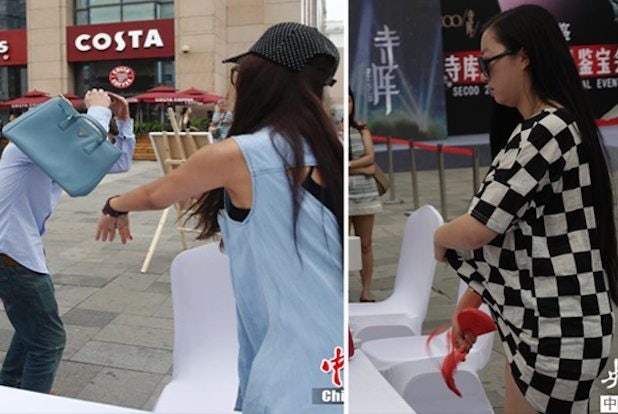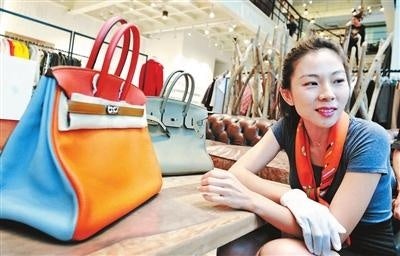
A recent appraisal event in Beijing hosted by secondhand luxury goods site Secoo grabbed headlines in China when one woman was less than impressed with her boyfriend's gift of a fake Prada bag (L) and another had her bra appraised (R).
Nothing reflects the rules of supply and demand more clearly than luxury counterfeits and knockoffs do as they continue to thrive in China. In addition to fakes sold on China’s “gray market,” the maturing tastes of Chinese consumers have also encouraged the secondhand luxury market to emerge as the bargain-hunting middle class seeks discounted luxury goods in the country. These two booming industries have together spurred the illegal circulation of counterfeit goods—and as a result, have incubated the strong and growing demand for luxury appraisers in China.
In response to the increasing popularity of luxury appraisal, numerous secondhand luxury sale giants recently held events with a focus on authenticity identification in downtown Beijing. In early August, the Taiwanese Bang Master Group held its first secondhand luxury auction and appraisal lectures at the Park Hyatt. A few weeks ago, leading O2O platform Secoo.com hosted a series of two events in Chongwenmen, including a free luxury appraisal service that helped the public to have their “treasures” scrutinized for authenticity, and a luxury identification contest featuring brand-recognition, authenticity-identification, and price-guessing games.
Episodes of erratic behaviors made headlines at Secoo’s luxury appraisal fair, where a woman was irritated by the appraiser after he said the handbag was neither a world-famous brand nor a luxury product, and then whipped off her luxury-brand bra to prove she was the owner of a luxury item. Another woman hit her boyfriend in the head with a handbag after discovering the bag he had bought for her was fake. These incidents not only soon became subjects of chatter, but can perhaps also be seen as a vivid example of consumers’ lack of access to accredited appraisal services and the challenges of establishing an authoritative appraisal organization in this vast market.
Recently, a journalist from a Wenzhou news website 66wz.com followed Chinese luxury consumers on their “journeys” to get their handbags identified for authenticity. Given that accredited luxury appraisal organizations are almost nowhere to be found in the country and most stores do not provide appraisal services unless there is a genuine receipt along with the product in question, luxury goods obtained through a third party (which is one of the major purchase channels in China) are more difficult to be identified.
There are, however, luxury appraisal websites in the country that provide services that involve shipping the item to self-proclaimed appraisers (often touting credentials such as at least seven years of experience) and receiving it shipped back with a verdict on its authenticity within 24 hours. The fees differ based on which brand the item belongs to; for example, appraising a Hermès item costs about 500 yuan (USD$82), and a Versace item costs about 200 yuan (USD$33).

A USD$5,340 luxury appraisal course in China. (Beijing Youth Daily)
Beijing Youth Daily recently published a story on reportedly Beijing’s first formal luxury appraisal training program, which gained a great deal of attention among local media thanks to its surprisingly high tuition fee of 32,800 yuan (USD$5,340) for a 10-day course and the fact that “luxury-goods appraiser” remains a new profession unheard of in China. The training program offers lectures in a small-group setting and gives both written and hands-on exams to students upon completion. Students will walk away with the ability to identify at least 70 percent of the counterfeit goods; however, the lecturer “does not recommend that students start practicing as luxury appraisers right after participating in this short-term training,” and expects to open higher-level programs. At present, China has not established professional licensure for such a profession. As an alternative, many fly to Japan, a more mature secondhand luxury market, for relevant training and certification.
Luxury appraisal clearly has its market potential in China, but for the time being, a lack of regulations and licensure can undoubtedly contribute to the chaos instead of controlling it.